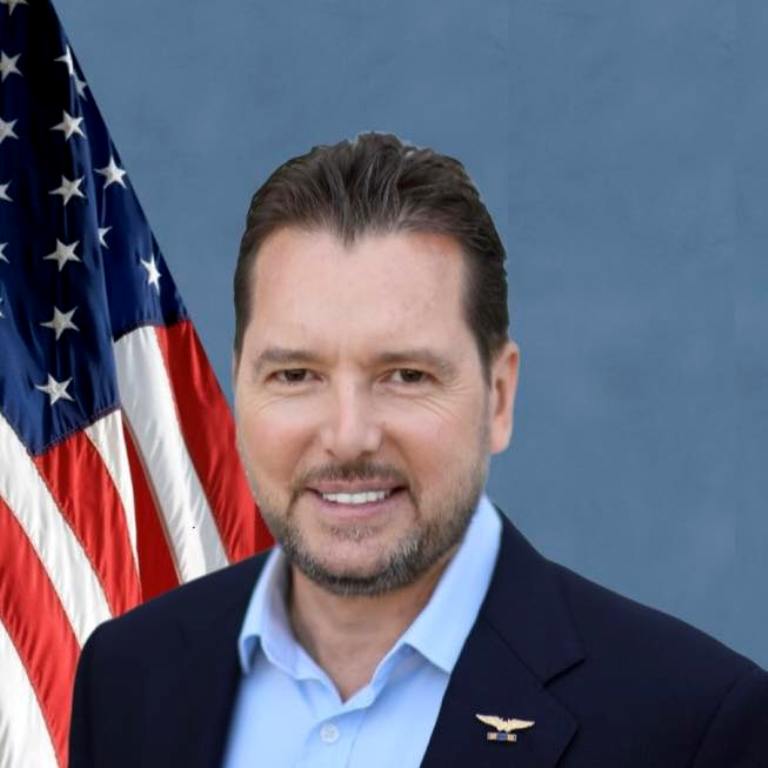EXCLUSIVE INTERVIEW
Commander Demetries Grimes is a former US naval officer, aviator and diplomat. He has served as naval attache to Greece and Israel, deputy commander of the US base in Crete, and adviser to NATO’s Maritime Commander in London, UK.
By Peggy Dokou
• Commander Grimes, as you recently referred, Donald J. Trump achieved one of the most historic multicultural victories in US electoral history. It was not just a victory. ”It was an amazing political comeback. A triumph” -as the world media said. In your opinion, why did the American people voted for him, again?
Donald J. Trump achieved one of the most historic and notable political victories in U.S. electoral history -a remarkable comeback that captured global attention. Why did the American people choose to re-elect him?
Despite enduring two impeachment attempts, significant electoral challenges, nearly a decade of relentless accusations, politically charged investigations, and even multiple assassination attempts, Donald J. Trump garnered widespread support across diverse demographics. Hispanic Americans, Black Americans, Jewish Americans, Muslim Americans, Indian Americans, younger voters, union members, and moderate Democrats, Republicans, and Independents shifted toward the Republican Party. This coalition helped secure the popular vote, the Electoral College, and majorities in the U.S. Senate, House of Representatives, as well as State governments throughout the country.
American voters delivered a decisive rebuke to the Biden-Harris administration, rejecting policies many believed were economically divisive, lenient on crime, supportive of open borders, and focused on identity politics over merit. Many saw the administration’s actions as overreaching and politically motivated, including efforts to censor opposing views and weaponize institutions.
As Florida Senator Marco Rubio, President Trump’s appointee for Secretary of State, aptly noted: Trump and the Republican Party succeeded because they treated voters as Americans—not categorized by race, religion, or lifestyle, but unified by shared national values and principles that are enduring.

• US President-elect Donald Trump promised a “strong military” and he repeated his pledge to end the war between Russia and Ukraine. At the same time he also wants to end bloodshed in the Middle East. Do you believe that the foreign policy of the USA should change soon?
The American people made it resoundingly clear that they believe in President Trump’s vision for American leadership rooted in “peace through strength” and a commitment to ensuring allies and adversaries alike are held accountable. Under President Trump’s leadership, foreign policy centered on advancing U.S. interests while promoting global stability, and voters clearly endorsed this approach.
During Trump’s first term, his administration achieved what many thought impossible: no new wars broke out. Instead, his foreign policy team focused on diplomacy and strategic strength, exemplified by the historic Abraham Accords, which brought together Israel and several Arab nations, creating a foundation for peace and cooperation in the Middle East. This success was a testament to President Trump’s leadership in fostering a pragmatic approach to resolving long-standing conflicts.
The administration also held allies accountable for their treaty obligations, notably insisting that NATO members increase their contributions to military readiness, thereby strengthening the alliance. At the same time, Trump’s team took a firm stance against adversaries, from Iran’s destabilizing actions in the Middle East to China’s aggression in the Indo-Pacific. They made it clear that such behaviors would not go unchecked, signaling a renewed American resolve on the global stage.
Additionally, Trump’s foreign policy team did not shy away from confronting Turkey over its support for groups like ISIS and Hamas and its destabilizing activities in the Eastern Mediterranean and beyond. By addressing these challenges head-on, the administration underscored its commitment to standing against terrorism and supporting peace and stability worldwide.
This decisive approach to foreign policy—rooted in strength, accountability, and peacebuilding—resonated deeply with the American electorate, who embraced President Trump’s vision for a stronger and safer America on the global stage.
• Many people say that this is going to be a totally new era for USA and for the planet. Can the world’s superpower be great again?
President Trump, America, and the free world dodged a bullet. Across the United States there is a renewed optimism for the future of the United States and its leadership on the global stage. Under President Trump’s guidance and his Cabinet Officer selections there is a clarity of purpose in identifying the true threats to freedom and prosperity, and providing decisive leadership to confront them.
President Trump aims to galvanize allies to reprioritize their efforts, focusing on rebuilding their economies, diversifying energy sources, and striving for energy independence—especially from adversarial nations. This strategic shift not only strengthens individual nations but also fortifies the collective security and economic stability of the free world. By encouraging allies to stand firm against the unprecedented collaboration of adversaries that seek to undermine representative democracy and the foundational freedoms of the West, Trump aims to restore focus on the principles that differentiate free “citizens” from “subjects.”
The American people and their allies are entering the dawn of a new era—one where the United States leads with strength and purpose, inspiring nations around the globe to reclaim their independence from coercive powers and reaffirm their commitment to liberty, justice, and sovereignty. President Trump’s foreign and domestic policies have set the stage for a resurgence of American greatness, proving that a strong America is essential for a free world.
As the world’s leading superpower, the United States is uniquely positioned to be great again—not just in terms of economic or military power, but as a beacon of hope and a defender of individual freedoms. The foundation has been laid for an era of unparalleled prosperity, stability, and peace, one that prioritizes the dignity of the individual and the sovereignty of nations. Under President Trump’s leadership, America and the free world have a renewed opportunity to rise to the challenges of this century and thrive together.

• Mr Trump was justified in his criticism of NATO’s European members who have let defense spending fall by the wayside. Some of the European leaders expressed their doubts about the new relations with the alliance. What should be the next steps?
Greece is in a favorable position as a pillar of stability in the region, trusted and aligned strategic partner, and one of the few NATO nations that steadfastly honors its treaty obligations.
President Trump’s firm stance on NATO has been widely misunderstood by some European allies. His criticism of certain member nations for failing to meet their treaty obligations wasn’t an attack on NATO—it was a defense of it. By allowing defense spending to fall below the agreed-upon 2% GDP threshold, these nations jeopardize the alliance’s collective security, undermining the very principles NATO was built upon. In truth, it is the neglect of these commitments—not President Trump’s insistence on accountability—that puts NATO at risk.
President Trump’s approach has been a wake-up call, reminding allies that NATO is only as strong as the collective contributions of its members. His message was clear: a fair and equitable partnership benefits everyone, ensuring that NATO remains a robust deterrent against adversaries while strengthening the alliance’s unity and credibility.
Some European leaders have expressed doubts about the evolving relationship with NATO under President Trump’s leadership, but this is an opportunity—not a crisis. The next steps should focus on reaffirming NATO’s shared purpose while addressing the challenges that have emerged:
1. Recommit to Shared Defense Goals: All members must honor their obligations, including meeting or exceeding the 2% GDP target for defense spending. This is not just a financial benchmark but a statement of commitment to collective security.
2. Enhance Strategic Cooperation: NATO must prioritize initiatives that strengthen its readiness to address 21st-century threats, including cyber warfare, energy security, and hybrid tactics used by adversaries like Russia and China.
3. Foster Transparent Dialogue: Open communication between member nations is essential to rebuild trust and clarify shared priorities. President Trump’s willingness to challenge the status quo should be seen as an opportunity to strengthen NATO’s mission, not as a source of division.
4. Focus on Adversaries, Not Allies: NATO’s strength lies in its unity against common threats. By standing firm against adversaries who seek to destabilize the alliance, members can reinforce the importance of mutual cooperation and trust.
President Trump’s leadership emphasizes that true allies hold each other accountable, and his vision brings renewed focus to NATO’s core purpose: defending freedom, sovereignty, and security for all its members. Moving forward, the alliance has the opportunity to emerge stronger and more united than ever before, proving that firmness and accountability are not threats to NATO but essential elements of its future success.

• What could we, in Greece, expect from now on?
Greece can expect a renewed era of decisive leadership and strengthened cooperation, grounded in aligned interests, shared principles, and enduring values. Under President Trump’s leadership, the focus on peace through strength and mutual accountability has revitalized alliances, ensuring that partnerships like the one between the United States and Greece remain rooted in respect and shared purpose.
For Greece, this means several positive developments:
1. Enhanced Security and Defense Cooperation: With a clear emphasis on NATO members fulfilling their commitments, Greece, as a nation that consistently meets its defense spending obligations, will continue to play a key role in the alliance. This positions Greece as a reliable partner and a regional leader in maintaining stability in the Eastern Mediterranean.
2. Support for Sovereignty and Stability: President Trump’s firm stance on holding adversaries accountable aligns with Greece’s efforts to counter destabilizing actions in the region, including Turkey’s provocations in the Aegean and Eastern Mediterranean. Expect continued U.S. support for Greece’s sovereignty and territorial integrity, with a focus on standing firm against threats to peace and stability.
3. Economic and Energy Collaboration: With energy independence and diversification as key priorities, Greece’s role as an emerging energy hub in the Mediterranean will likely receive strong backing. U.S. support for projects like the EastMed pipeline and LNG terminals reinforces Greece’s position as a vital player in regional energy security, reducing reliance on adversarial energy sources.
4. Cultural and Strategic Alignment: The shared values of democracy, freedom, and respect for sovereignty create a natural alignment between Greece and the U.S. Greece can anticipate increased collaboration on issues such as education, technology, and trade, further strengthening the bonds between the two nations.
5. Forward Deterrence: Greece’s strategic geographic position and its role as host to the United States’ easternmost forward operating base at Souda Bay, Crete, are vital to global deterrence and power projection. Souda Bay serves as a critical hub for U.S. and NATO operations, ensuring rapid deployment capabilities and a sustained presence in the Eastern Mediterranean, North Africa, and the Middle East. This makes Greece an indispensable partner in countering threats, maintaining freedom of navigation, and deterring adversarial actions in a region that is increasingly central to global security. Greece’s commitment to this role underscores its value not only to regional stability but to the broader strategic interests of the free world.
Greece stands to benefit significantly from a U.S. foreign policy that prioritizes strong alliances and principled leadership. As a nation deeply connected to the ideals of democracy and freedom, Greece is well-positioned to thrive in this new era of cooperation and mutual respect. Together, the United States and Greece can continue to champion stability, prosperity, and shared values in the Mediterranean and beyond.
• What’s the plan about the illegal migration? Is this a big ‘bet’ for the new elect government of USA?
The American electorate has unequivocally expressed a desire for decisive action on the pressing issue of illegal immigration, distinguishing it clearly from legal immigration—a challenge that Europe similarly confronts.
Addressing illegal migration is indeed a significant priority for the newly elected U.S. government. President-elect Donald Trump has articulated a comprehensive strategy to tackle illegal immigration, emphasizing the following key components:
1. Mass Deportations: Plans are underway to implement large-scale deportations of individuals residing in the U.S. without legal authorization. Tom Homan, appointed as the “Border Czar,” has detailed the use of military resources to support these operations, focusing on logistical roles to enhance the efficiency of Immigration and Customs Enforcement (ICE) agents.
2. Utilization of Military Assets: The administration intends to declare a national emergency to facilitate the deployment of military assets in immigration enforcement, aiming to bolster border security and expedite deportation processes.
3. Addressing Sanctuary Cities: There is a concerted effort to confront sanctuary cities that limit cooperation with federal immigration authorities. Strategies include potential legal actions and withholding federal funds to encourage compliance with federal immigration laws.
4. Reevaluation of Birthright Citizenship: The administration is exploring measures to end birthright citizenship for children born in the U.S. to undocumented immigrants, proposing that at least one parent must be a U.S. citizen or legal resident for the child to receive automatic citizenship.
This comprehensive approach reflects the administration’s commitment to addressing illegal immigration through robust enforcement and policy reforms, aligning with the electorate’s call for action on this critical issue.



